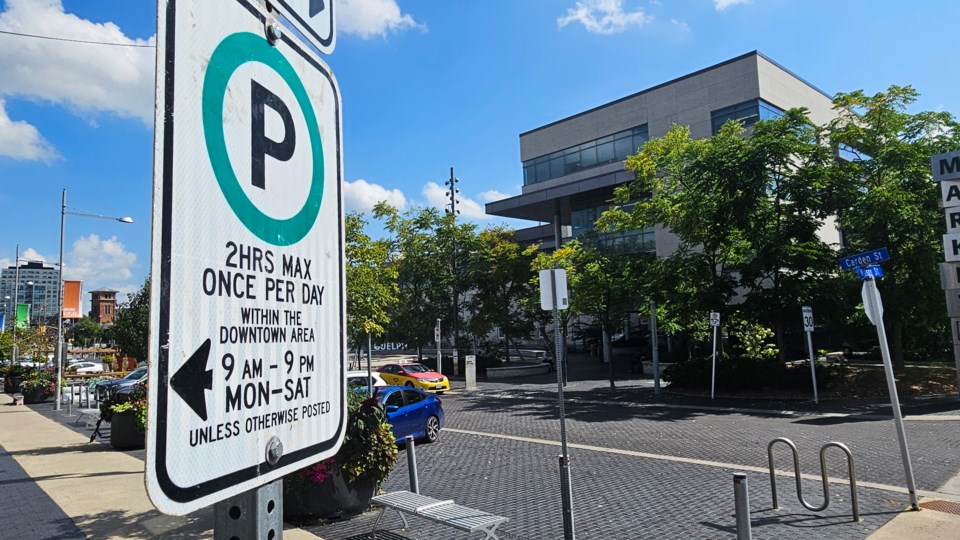In an effort to encourage new housing in the downtown core, city council is poised to reduce the minimum number of parking spaces those builds need for residents.
By how much remains up in the air.
Meeting as the committee of the whole on Wednesday, council approved a staff recommendation to reduce the requirement to 0.85 spaces per unit from one space per unit, though several members called for a more aggressive plan to spur housing as well as shift Guelphites away from personal vehicles to transit and active transportation such as bicycles.
“It’s quite promising,” Coun. Rodrigo Goller said of the proposed downtown parking master plan, noting he has concerns. “I’m really struggling here with if this goes far enough.”
“I do think we need to be a little more aggressive,” added Coun. Ken Yee Chew.
The only council member to vote against the plan at the committee level was Mayor Cam Guthrie, who repeatedly spoke in favour of eliminating parking minimums entirely in the core – something he said “hundreds” of North American cities have already done, including Kitchener.
“We do need a revolution when it comes to parking,” said Guthrie, who feels the market should dictate what parking is provided. “I cannot support this as it is.”
Before a final decision is made during the Sept. 26 council meeting, staff was directed to look into several alternatives. Among them is reducing the parking minimum to 0.5 spaces, and scrapping parking minimums entirely for student and affordable housing.
“The outcome of this really needs to be about balance,” commented Coun. Leanne Caron, noting the need to support residential development as well as the parking needs of downtown businesses.
Council also heard from delegates who encouraged them to go beyond the staff recommendation.
Victor Labreche of planning consultants Arcadis IBI Group urged council to maintain parking exemptions for existing commercial and office buildings constructed before June 7 of 1971 into residential units and move up the construction date to 2023 so it applies to more buildings.
His client, Woodhouse Investments Inc., owns the building at the corner of Wyndham and Cork streets – former home of a TD Canada Trust bank branch. He said the building, which was constructed in 1981, is currently about half empty and his client is considering adding a residential component.
Asked why the 1971 date was chosen, Walkey explained that’s when the city’s first comprehensive zoning bylaw was implemented and there were no parking requirements for buildings prior to that date.
Adrian Salvatore, chair of the Guelph Coalition for Active Transportation, urged council to do more to get people away from on-street parking and into parkades.
Guelph & District Home Builders’ Association (GDHBA) and Guelph-Wellington Development Association (GWDA) threatened to appeal if council gives its approval to the plan’s zoning bylaw amendment before the Ontario Land Tribunal (OLT) rules on existing appeals of the city’s comprehensive zoning bylaw.
“For greater certainty, the GDHBA and GWDA have no concerns with the city holding a public meeting or soliciting public feedback on the downtown master plan or on potential changes to the zoning bylaw, however, only the OLT has the jurisdiction to amend the 2023 zoning bylaw while under appeal at this time,” state lawyers representing the two groups in a letter to council.
A new comprehensive zoning bylaw was approved by council in April. Within weeks, the city received notice of 16 appeals to the OLT, including many from the development industry.
However, Krista Walkey, the city’s general manager of planning and building services, said the appeals don’t prevent council from approving the amendment. Rather, she said, it would provide transparency to developers and the OLT about council’s wishes.
The previous comprehensive zoning bylaw, which sets rules for properties throughout the city, was put in place in 1995, though it’s been amended many times in the years since.
Despite the proposed parking deduction for developers, city officials hope to increase the overall supply of downtown parking spaces by 700 leading up to 2051. The city’s population is mandated to grow to 208,000 by then, up from the current 145,000.
Currently, the city operates three downtown parkades, five surface parking lots and a permit program on select city streets downtown. There are also 600 on-street parking spaces downtown.
A fourth parkade, below the new central library, is expected to come on stream in 2026.
In terms of implementing paid on-street parking, staff told the committee part of the goal is to shift financial responsibility away from property taxpayers as a whole and on to the users. The staff plan calls for the idea to be evaluated starting in 2028.
The committee-approved master plan also includes direction to staff to create a cash-in-lieu of parking prgram for new downtown builds, as well as consider implementing paid on-street parking. The latter is to be studied beginning in 2028.
